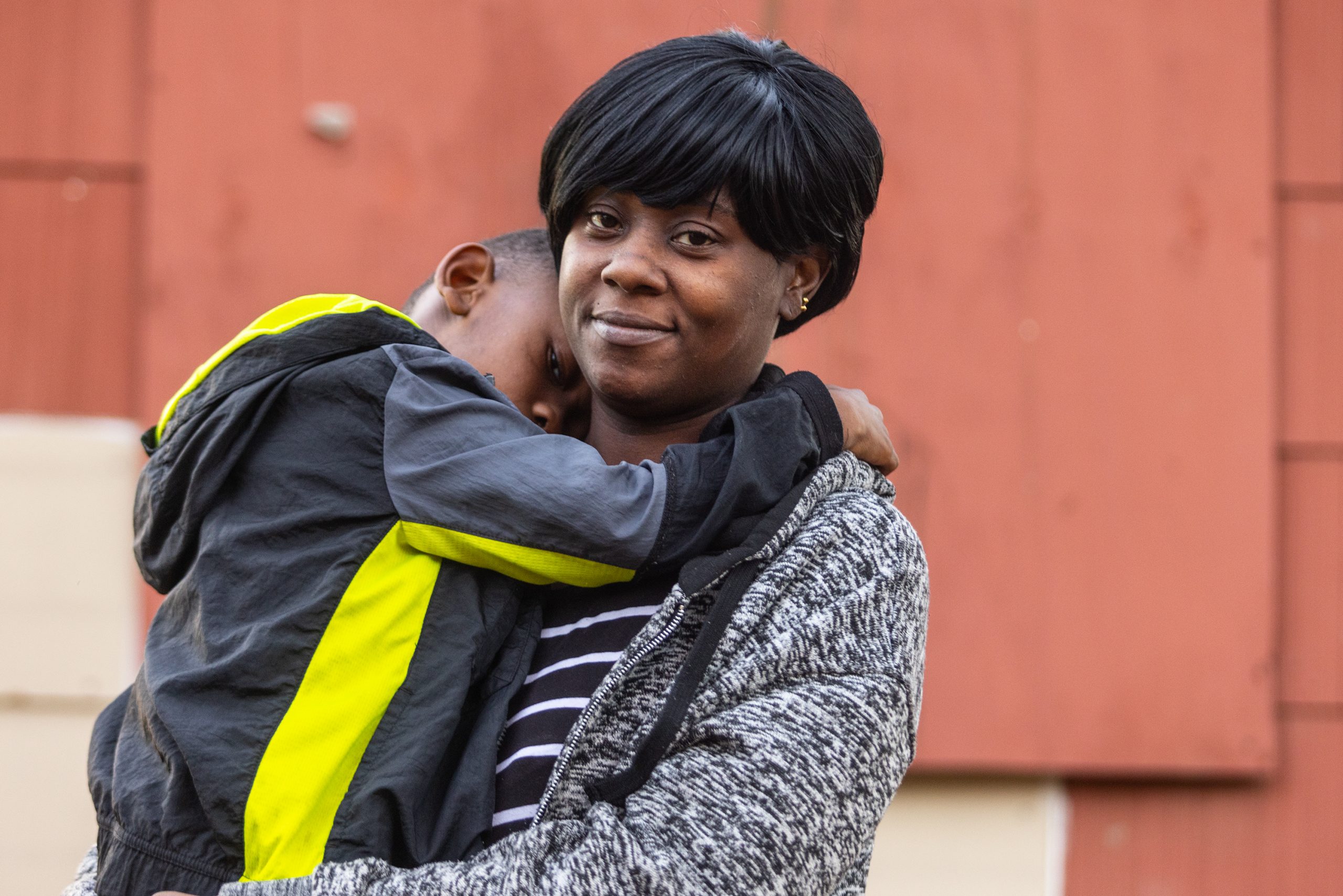Mississippi Today
Welfare recipient won’t stop fighting for ‘decency and common sense’
Welfare recipient won’t stop fighting for ‘decency and common sense’
The state of Mississippi isn’t getting anything past Danielle Thomas.
Thomas is a bright, young single mother raising her six kids in south Jackson. Because she lives in poverty, Thomas is also an expert in the convoluted policies and bureaucratic red tape surrounding one of the biggest scandals in state history: the TANF program.
Despite recent attention on the graft and corruption within the state’s Temporary Assistance for Needy Families block grant, Mississippi is still pumping less than 5% of the money directly to mothers like Thomas.
“I really think it’s still them stealing from people, to be honest,” Thomas, 34, said. “I really feel like they feel like a lot of us aren’t smart enough, or they feel like we probably don’t know the system in and out well enough.”
Thomas works part time as a home health aide earning $9.50 an hour, the same wage she started at 10 years ago. When she’s not on the job, she’s feeding and changing her 5-month-old, ferrying her other kids to and from school, cooking meals, fetching medication, tending to boo-boos, monitoring screen time, and trying to keep the shrieking to a tolerable decibel.
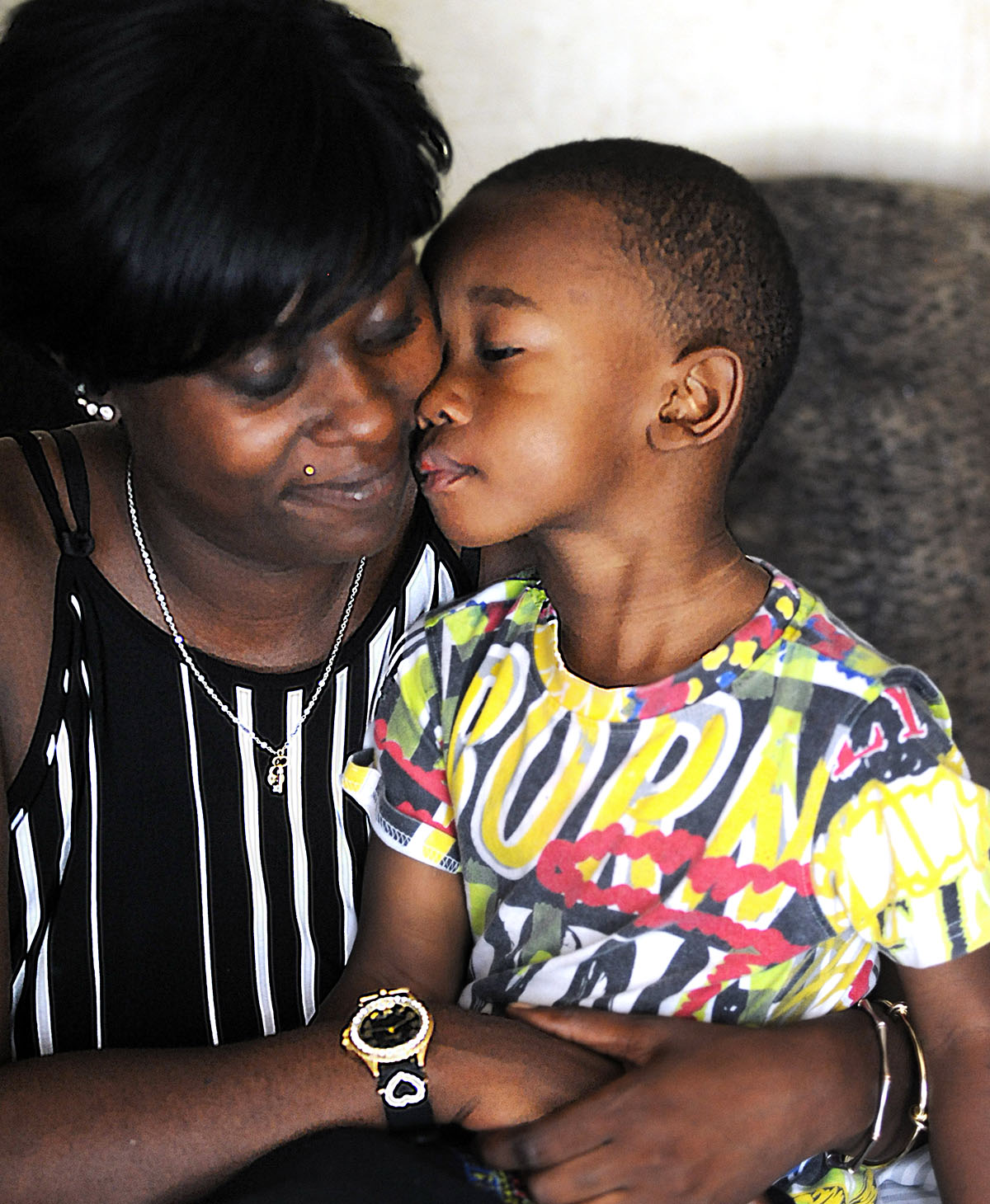
On top of all that, Thomas basically moonlights as the unpaid lawyer, auditor and investigator on her own cases at the Mississippi Department of Human Services and other state service agencies. As most public assistance recipients know, it takes fierce self advocacy to ensure fair treatment within Mississippi’s social safety net.
Only about 1,600 very poor families in Mississippi are successfully jumping through the hoops required to receive the small TANF cash assistance payments each month.
Thomas knows a great deal more about how the TANF program works than the politicians who write the laws that govern the program.
But what happened to Thomas in recent weeks has stumped even the nation’s top policy experts.
In October, Thomas learned that she would be receiving a lump sum of more than $5,000 in back due child support from her ex-husband Larry Young, the father of her four youngest children. The state’s child support office, run by a private contractor, intercepted the money from Young’s child tax credit.
This tax offset process is part of the state’s child support enforcement program that Thomas is required to participate in to keep receiving public benefits. The rationale is, if the state is going to provide taxpayer support to single-parent families, then the noncustodial parents, usually fathers, should be forced to pay up as well.
This is where things get tricky: When the office collects support on behalf of a child receiving TANF, the state then seizes the funds to pay itself back for the welfare payments it issued. Most of that money goes straight back to the federal government.
Thomas said she sees the rationale in this, but at the same time, “I think that’s messed up a lot of co-parenting relationships … it doesn’t help how they think it helps. It kinda actually divides the family a little more.”
Thomas receives assistance from the Supplemental Nutrition Assistance Program, formerly known as food stamps, for all of her children – several hundred dollars a month that comes on a debit card Thomas can only use on qualified items at qualified stores.
But Thomas only receives TANF cash assistance, $118 a month, for each of the two eldest children, not Young’s kids.
This is because of a harsh and little-known rule in Mississippi that if a parent is already on welfare when she gets pregnant and gives birth, that new child is not eligible for TANF benefits. These are sometimes called “capped” children. Just 12 states still have this policy in place, according to a 2020 Center on Budget and Policy Priorities report.
For Thomas, this makes the child support payments for the younger kids all the more crucial.
The $5,000 cash infusion from the tax credit was coming just in time for Christmas. Thomas also planned to use some of the money to replace the radiator fan and valve cover gasket on her 2012 Dodge Durango – long overdue repairs on her only mode of transportation to work and the kids’ schools. Right now, she gets under the hood and manually sets spark to the fan before driving anywhere.
Thomas and her kids survive on the combination of her work income, no more than $13,000 a year, about $900 in monthly Supplemental Security Income, or disability benefits, that Thomas gets for her severe depression and anxiety attacks, and the public assistance. Because Thomas receives disability, she doesn’t receive a TANF payment for herself.
The prospect of a financial cushion provided Thomas some hope, but it was short lived.
In late October, Thomas received the child support payment on her debit card. It was $100.
She called a representative at the child support office, who told her that, according to the computer screen she was looking at, the TANF program had seized the rest.
That’s not how that works, Thomas thought.
“TANF took $5,000 from my kids, but the kids that they took the money from, they don’t receive TANF. They have never received TANF,” Thomas said.
Without the incoming funds, Thomas told her ex she still needed him to help pay for clothes and shoes for the kids. At first, the dad was skeptical that the state had taken the money. The situation caused tension between the parents.
“It makes me feel bad,” Young said. “It’s sad how Mississippi does things, man. Mississippi don’t care about no one, but what they do? Help Brett Favre. Help Phil (Bryant). They don’t help the ones that actually need help.”
Mississippi, which offers some of the lowest wages, strictest public assistance requirements, fewest labor protections and most meager health care of any state is also the most poverty stricken.
But Mississippi politicians have long blamed “fatherlessness” and nonmarital pregnancy for the state’s high poverty rate, ignoring the research that reflects the inverse: that those family outcomes are most often a symptom of poverty – and the feeling that upward mobility is unachievable – rather than the cause of it.
Instead of focusing on evidence-based practices for interrupting systemic poverty, the state has spent hundreds of millions of welfare funds attempting to address fatherhood and teen pregnancy. Along the way, MDHS admits it has gathered no evidence of how these “family stabilization” programs reduced poverty.
Millions through these programs ended up going to the pet projects of former NFL quarterback Brett Favre, other famous athletes and the cronies of state politicians.
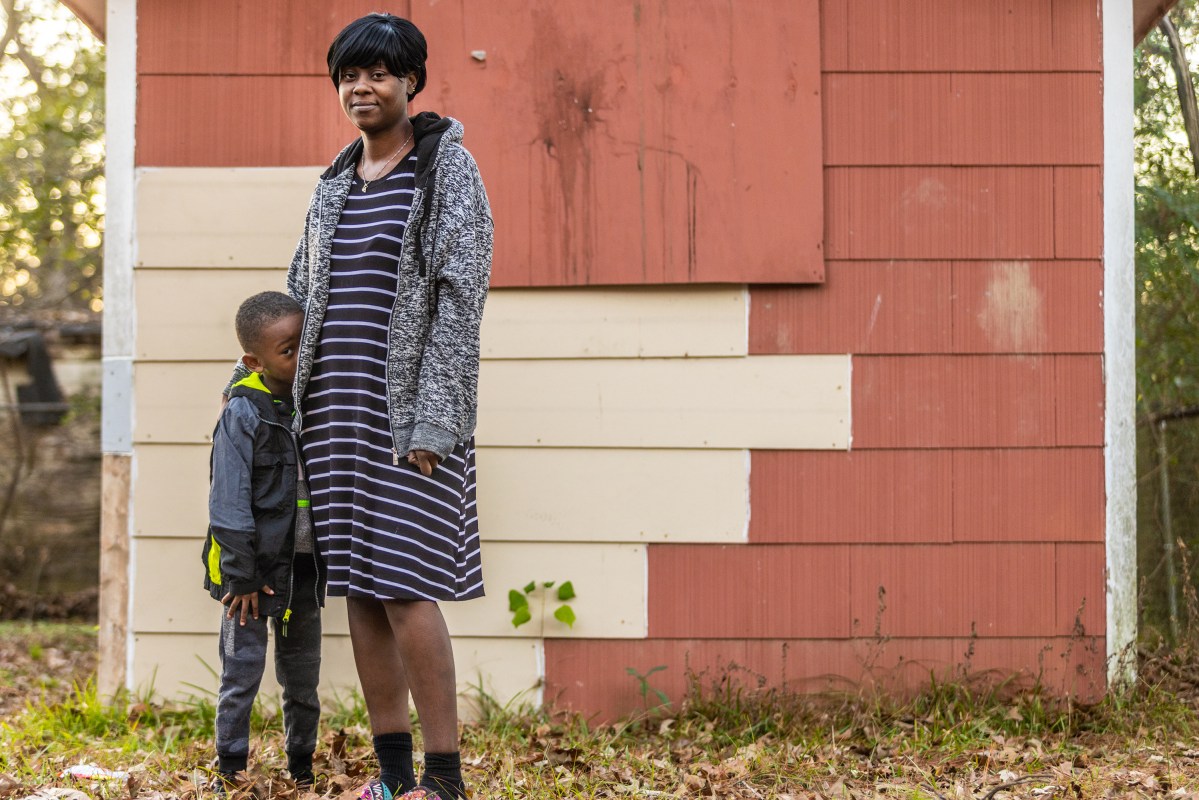
Escaping poverty was always going to be a challenge for Thomas, whose parents split before she could remember. Child Protection Services took Thomas from her mother, who is legally blind and ran an unstable household, when she was 6. She moved with her father to South Carolina until her mom regained custody, and, at 16, Thomas returned to Jackson. She bounced around high schools before dropping out, meeting her first child’s father and becoming a mother.
Thomas secured her GED and has started several higher education programs in the hopes of securing a better paying job, but it seemed like something always got in the way of her finishing. “I start strong, I start motivated, and then I might take a blow from different things and I kind of back out,” she said.
She has prioritized the paying gig that she has versus striving for another because, she said, “I know from experience that if I don’t work, we don’t eat.”
Several years ago, Thomas entered a work program offered through SNAP, the federal food assistance program administered by Mississippi Department of Human Services. It was a 24-week course, she recalled, to learn medical billing and coding – a job in which she could potentially earn $50,000. The program promised to provide her with a certificate at the end.
“During the seventh week, we went in and they told us it was no funds left to be able to continue the program,” Thomas said. “I really felt like it might have been something where they just found a way to reroute the money.”
Like that, the program was over.
During the pandemic, Thomas had to leave her home health job to take care of her kids, who were conducting virtual school at home. She applied for unemployment, which would have provided her an additional $600-a-week, more than she’d ever made and finally a chance to get ahead. But unemployment insurance only covers people who make over a certain amount, and because of her low earnings, the Mississippi Department of Employment Security denied Thomas the benefits.
It appeared a technicality: Thomas didn’t qualify under traditional unemployment insurance rules, but she should have qualified under the special pandemic unemployment program, the purpose of which was to extend benefits to people not typically covered, including part-time workers like herself.
Thomas did her research, appealed the decision, and secured a hearing with the labor office. She even got her employer to corroborate the information on her claim. But after representing herself in the proceeding, she was still denied because she had filed under the traditional unemployment insurance.
Through setback after setback, Thomas doesn’t blame the government for her current situation.
“I’m not a victim because I know the decisions and the choices I have made when it comes to these children and certain things, I’ll take the accountability for. But when it comes to my children … I’d shovel horse manure to make sure my kids eat every night. There’s nothing I wouldn’t do to make sure me and my children have a roof over our head and we have food on the table.”
Then there’s the added stress of raising her children in a neighborhood where gun violence is prevalent. “We’re in an area that’s really crime-ridden. It’s real, real crime-ridden and poverty-ridden,” Thomas said.
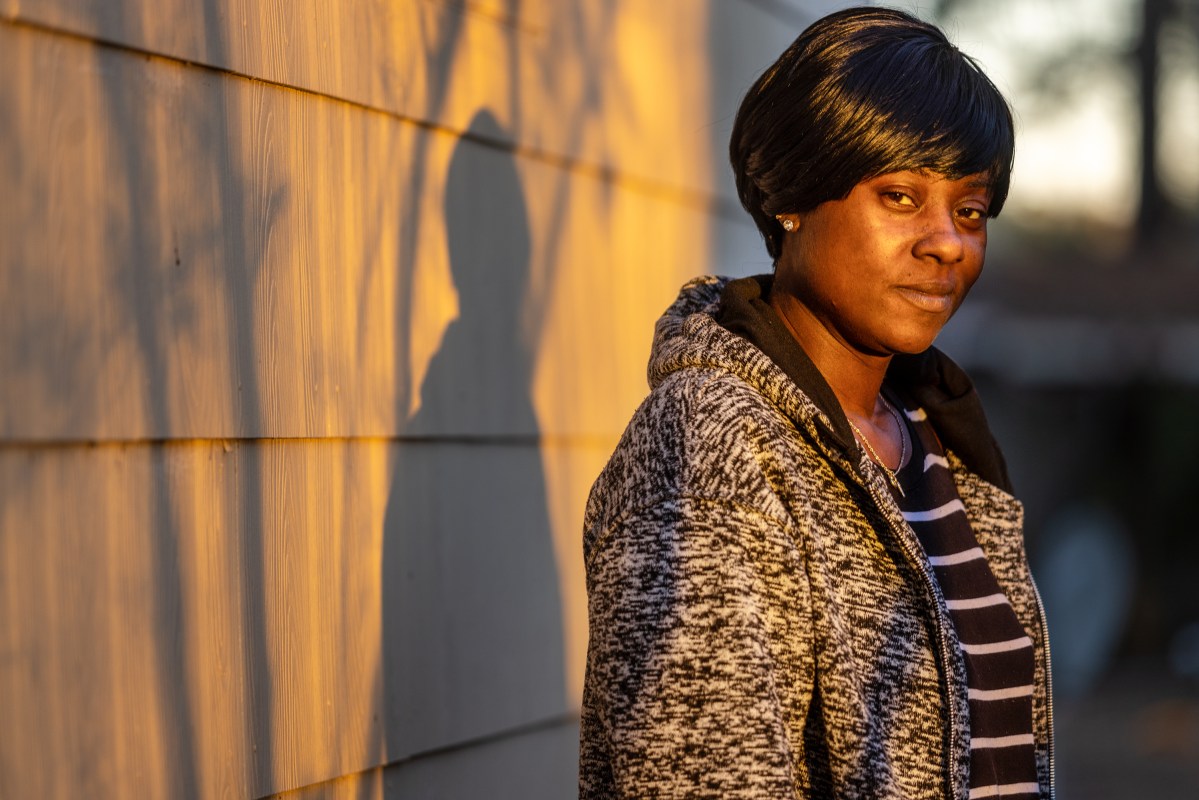
Not too long ago, Thomas’ 9-year-old son found a bag of marijuana on the ground on his way to school. A curious mind, he picked it up and carried it with him to class. When the administration discovered it, Thomas said they almost opened a DHS case, but because she’d been such an attentive parent – attending all parent-teacher conferences and volunteering to bring food for parties – a school administrator vouched for her.
“I’ve been raised in this type of environment … but I don’t wanna repeat cycles. I wanna break generational curses. I don’t want us to be here, but for some reason I feel like I’m stuck, because nothing will come in to allow me to get away from here,” Thomas said.
“Yes, I had all these kids. I made this bed. I have to lay in it,” she said. “But I also know I’m the type of person to where I’m not looking for the government to take care of me and my kids. I can do without, but they also gotta realize the trauma that they have forced upon some of us to where we can’t even live properly. Like, I don’t even like going outside of my home unless I have to.”
In August, State Auditor Shad White, who initially launched the ongoing TANF fraud investigation, released a report demonstrating the cost of “absent fathers” to Mississippi taxpayers. The report focused on how children who grow up in single-parent households are less likely to finish high school, more likely to go to prison and more likely to become teen mothers.
“I’m hoping folks will be informed as taxpayers, but will also realize collectively as a society we need to be sending the message that if you’re man enough to father a child, you ought to be man enough to step up and help raise that child,” White said when the report was released, WXXV reported.
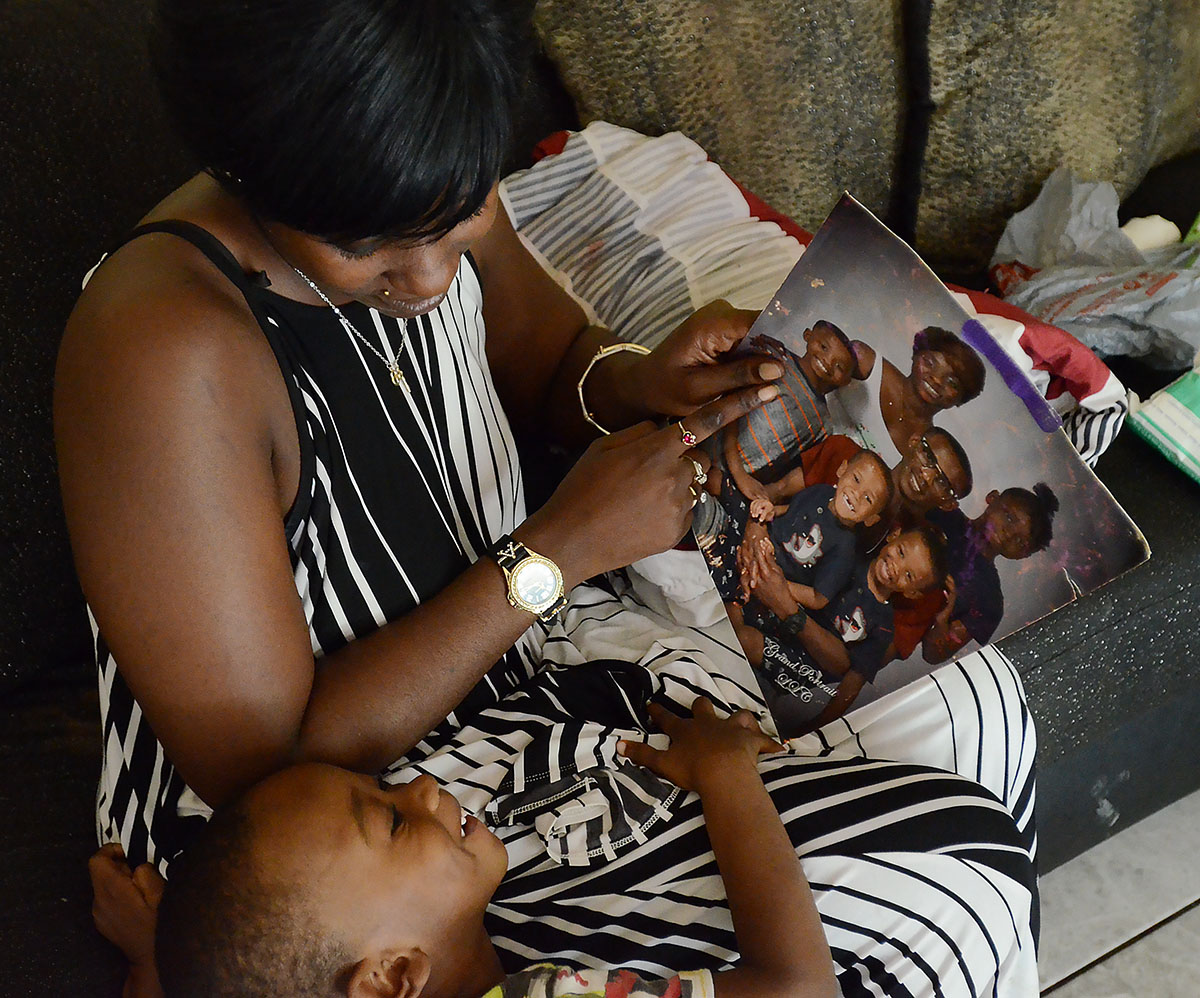
In Young’s case, Mississippi has done nothing to inspire his participation. The state took from him to indirectly support the kids of someone else, while his own kids got nothing.
National policy experts have long advocated against states confiscating the child support payments of poor children to pay back the TANF support they received. They say the practice, which barely makes a difference for states since the money is returned to the feds, keeps families in poverty and harms the relationship between children and their noncustodial parents.
“In this case, it’s even worse: the state is taking money paid by a father for children who the state didn’t even provide assistance to,” said Elizabeth Lower-Basch, deputy director for policy for the Center for Law and Social Policy (CLASP). “While the state may have found a loophole that makes this legal, keeping these funds from Mrs. Thomas and her children is a violation of both decency and common sense.”
Little to no research on this scenario exists. Mississippi’s TANF policy manual doesn’t explicitly address it, according to the reviews of Mississippi Today and two national experts who reviewed the manual at Mississippi Today’s request for this story. It does not come up in exhaustive Q&As published by the federal agency that administers the programs, the Administration for Children & Families under the U.S. Department of Health and Human Services. When asked about what happened, the federal office told Mississippi Today that the agency was following Mississippi state law.
The Mississippi Department of Human Services similarly confirmed in an email to Mississippi Today that this is the agency’s policy.It said it could not comment on Thomas’ case specifically.
“While they (capped children) are not considered in the calculation of benefits, these children are still part of the head of household’s TANF case,” the statement reads. “When there are multiple children in the TANF-recipient household with different non-custodial parents, and one of those non-custodial parents makes a child support payment, that payment is applied to the overall household’s TANF recovery balance.”
It’s a miniscule policy distinction but with substantial implications – as is true with much of the state’s social safety net. The Legislature could change it.
But this area of government is often too complicated, too niche to capture the attention of the public or even policy makers. It’s part of the reason so much corruption was able to occur within the program in recent years.
Without a closer analysis, it’s easy to miss the catch-22.
When it behooves the state to exclude the children, in the case of determining who gets monthly benefits, it excludes the children. But when it benefits the state to count the children, such as to seize their child support payments, it counts them.
MDHS said it did not have any data on how many mixed-family households this policy affects.
Thomas questions it plainly: “I don’t see how one parent can be responsible for what another parent owes.”
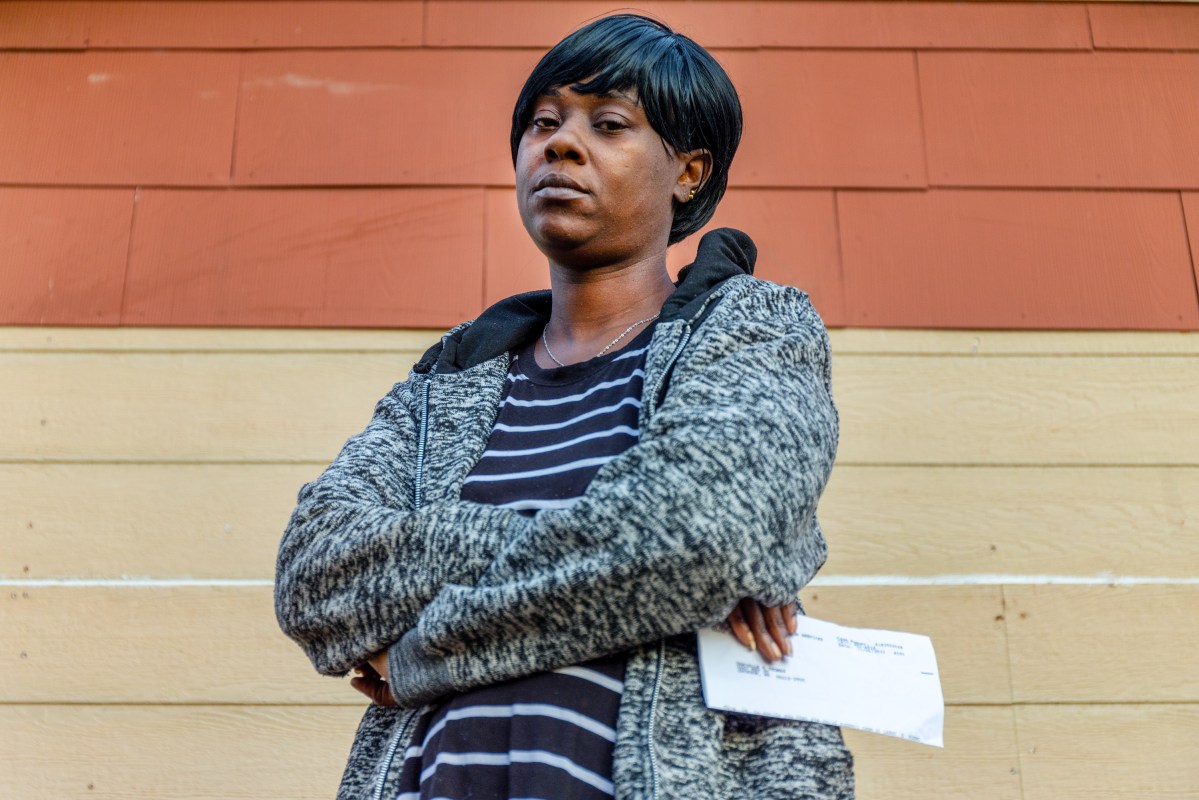
Since the $100 child support payment, Thomas has had countless calls with MDHS, the child support office, and advocates, many of whom told Thomas they’ve never encountered this scenario and that they believed it was a mistake.
When Thomas visited MDHS in person, a supervisor in the office said her TANF case carried an unreimbursed balance of about $17,000 – a mathematical mystery since she’s only received a total of $146-a-month for both children, recently raised to $236-a-month, on and off over the last several years. TANF has a lifetime limit of 60 months. At one point, an MDHS caseworker told Thomas she had been receiving TANF for two children since 2008, before her second child was even born.
“I’ve calculated and added some things up myself and I’m like, you know, ain’t no way,” Thomas said. “… It’s a lot of things I’m not understanding, but I’m really thinking like it is really just (determined by) who reviews your case and files at the time. Like, if you have someone who is reviewing your case who might let some stuff slip through the system.”
Shortly after she began pressing the agency, Thomas found a letter in her mail. It was from the child support office, notifying her that her entire MDHS public assistance case had been closed. This wasn’t true, but it added to her list of issues to resolve. She wondered if her speaking out had triggered this notice.
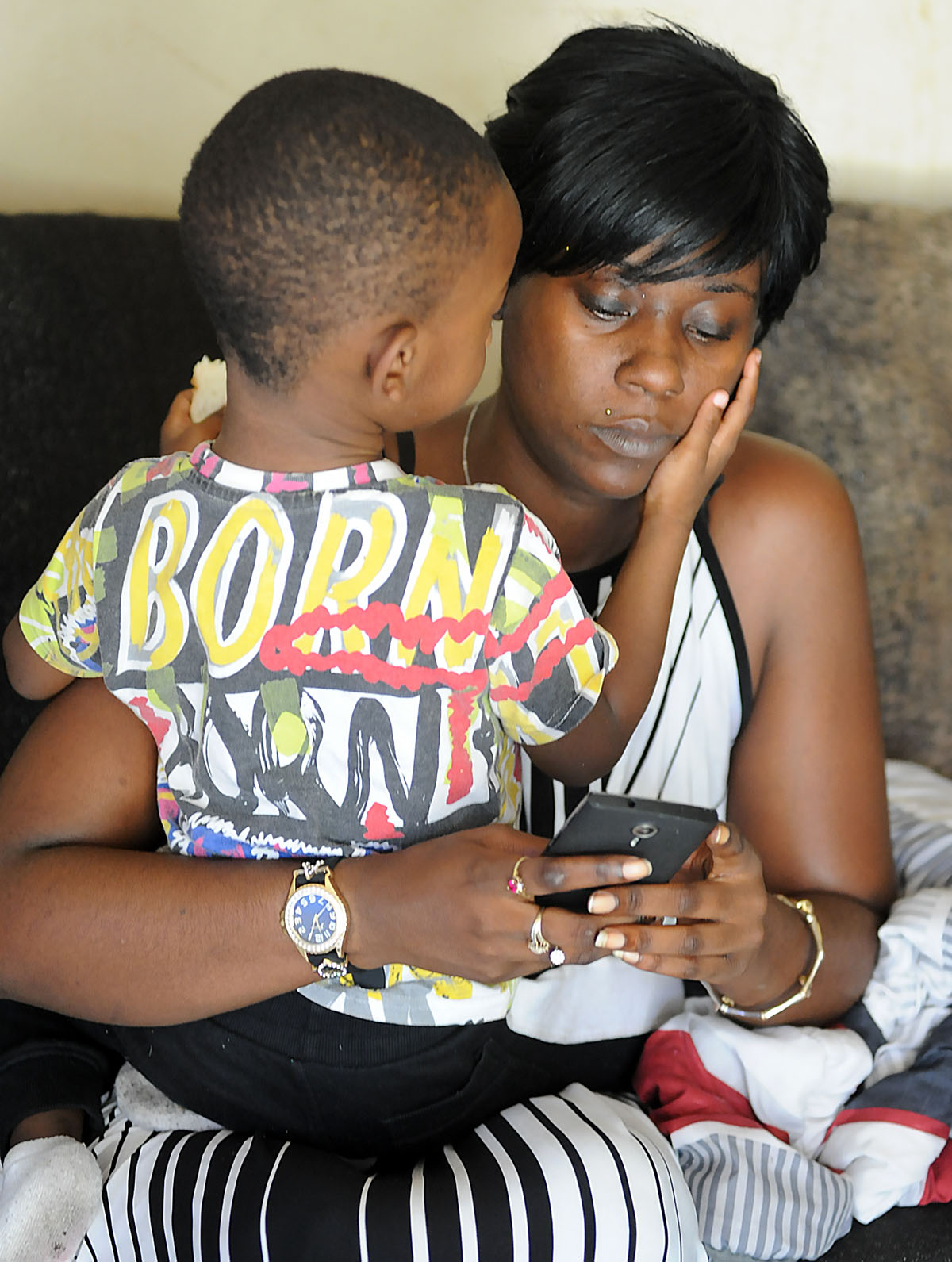
Several days later, Thomas received another letter. This one targeted her 5-month-old, who had barely begun receiving assistance, and ordered Thomas to add the baby to her child support case. The notice said she had 21 days to visit the office and hand over paperwork proving the child’s father or her entire family would be cut off from assistance altogether.
Following Mississippi’s ban on abortion, which led to the overturning of Roe v. Wade, Mississippi Attorney General Lynn Fitch and others have advocated for more strictly enforcing child support. The policy is advertised as a protection for mothers.
But for Thomas, the state’s meddling has only hurt her.
“They usually don’t contact you this early,” Thomas said after receiving the last letter. “I really feel like once again, this has something to do with me going and talking to people about them.”
With about $12,000 in supposed unreimbursed TANF still hanging over her head, it’s questionable if she’ll ever see a dime of child support from any of the three fathers of her children.
By this point, Thomas was dejected.
“I don’t understand how this system works,” she said in a slow, flat voice. “I’m no longer trying to figure out how it works.”
In fact, Thomas understands better than anyone how the system works. It is working the way it was designed, by wearing down the people it purports to serve.
But then, after talking to a free legal aid office, Thomas learned she could request a formal hearing from the TANF office to challenge the paradoxical policy. It’s scheduled for later this month. She’s already downloaded and started reading the agency’s program manuals from its website.
“I’m actually not going to stop fighting,” Thomas said.
In one of her educational stints, Thomas was studying to become a paralegal. When she thinks about going back to school, that’s the career path she envisions.
If her TANF case is any indicator, she’s a natural.
This article first appeared on Mississippi Today and is republished here under a Creative Commons license.
Mississippi Today
Mississippi prepares for another execution
The Mississippi Supreme Court has set the execution of a man who kidnapped and murdered a 20-year-old community college student in north Mississippi 30 years ago.
Charles Ray Crawford, 59, is set to be executed Oct. 15 at the Mississippi State Penitentiary at Parchman, after multiple requests by the attorney general’s office.
Eight justices joined the majority opinion to set the execution, concluding that Crawford has exhausted all state and federal legal remedies. Mississippi Supreme Court Justice T. Kenneth Griffis Jr. wrote the Friday opinion. Justice David Sullivan did not participate.
However, Kristy Noble with the Mississippi Office of Capital Post-Conviction Counsel released a statement saying it will file another appeal with the U.S. Supreme Court.
“”Mr. Crawford’s inexperienced trial counsel conceded his guilt to the jury — against Mr.
Crawford’s timely and repeated objections,” Noble said in the statement. “Mr. Crawford told his counsel to pursue a not guilty verdict. Counsel did just the opposite, which is precisely what the U.S. Supreme Court says counsel cannot do,” Noble said in the statement.
“A trial like Mr. Crawford’s – one where counsel concedes guilt over his client’s express wishes – is essentially no trial at all.”
Last fall, Crawford’s attorneys asked the court not to set an execution date because he hadn’t exhausted appeal efforts in federal court to challenge a rape conviction that is not tied to his death sentence. In June, the U.S. Supreme Court declined to take up Crawford’s case.
A similar delay occurred a decade ago, when the AG’s office asked the court to reset Crawford’s execution date, but that was denied because efforts to appeal his unrelated rape conviction were still pending.
After each unsuccessful filing, the attorney general’s office asked the Mississippi Supreme Court to set Crawford’s execution date.
On Friday, the court also denied Crawford’s third petition for post-conviction relief and a request for oral argument. It accepted the state’s motion to dismiss the petition. Seven justices concurred and Justice Leslie King concurred in result only. Again, Justice Sullivan did not participate.
Crawford was convicted and sentenced to death in Lafayette County for the 1993 rape and murder of North Mississippi Community College student Kristy Ray.
Days before he was set to go to trial on separate aggravated assault and rape charges, he kidnapped Ray from her parents’ Tippah County home, leaving ransom notes. Crawford took Ray to an abandoned barn where he stabbed her, and his DNA was found on her, indicating he sexually assaulted her, according to court records.
Crawford told police he had blackouts and only remembered parts of the crime, but not killing Ray. Later he admitted “he must of killed her” and led police to Ray’s body, according to court records.
At his 1994 trial he presented an insanity defense, including that he suffered from psychogenic amnesia – periods of time lapse without memory. Medical experts who provided rebuttal testimony said Crawford didn’t have psychogenic amnesia and didn’t show evidence of bipolar illness.
The last person executed in Mississippi was Richard Jordan in June, previously the state’s oldest and longest serving person on death row.
There are 36 people on death row, according to records from the Mississippi Department of Corrections.
Update 9/15/25: This story has been updated to include a response from the Mississippi Office of Capital Post-Conviction Counsel
This article first appeared on Mississippi Today and is republished here under a Creative Commons Attribution-NoDerivatives 4.0 International License.
The post Mississippi prepares for another execution appeared first on mississippitoday.org
Note: The following A.I. based commentary is not part of the original article, reproduced above, but is offered in the hopes that it will promote greater media literacy and critical thinking, by making any potential bias more visible to the reader –Staff Editor.
Political Bias Rating: Centrist
The article presents a factual and balanced account of the legal proceedings surrounding a scheduled execution in Mississippi. It includes perspectives from both the state’s attorney general’s office and the defense counsel, without using emotionally charged language or advocating for a particular political stance. The focus on legal details and court decisions reflects a neutral, informative approach typical of centrist reporting.
Mississippi Today
Presidents are taking longer to declare major natural disasters. For some, the wait is agonizing
TYLERTOWN — As an ominous storm approached Buddy Anthony’s one-story brick home, he took shelter in his new Ford F-250 pickup parked under a nearby carport.
Seconds later, a tornado tore apart Anthony’s home and damaged the truck while lifting it partly in the air. Anthony emerged unhurt. But he had to replace his vehicle with a used truck that became his home while waiting for President Donald Trump to issue a major disaster declaration so that federal money would be freed for individuals reeling from loss. That took weeks.
“You wake up in the truck and look out the windshield and see nothing. That’s hard. That’s hard to swallow,” Anthony said.
Disaster survivors are having to wait longer to get aid from the federal government, according to a new Associated Press analysis of decades of data. On average, it took less than two weeks for a governor’s request for a presidential disaster declaration to be granted in the 1990s and early 2000s. That rose to about three weeks during the past decade under presidents from both major parties. It’s taking more than a month, on average, during Trump’s current term, the AP found.
The delays mean individuals must wait to receive federal aid for daily living expenses, temporary lodging and home repairs. Delays in disaster declarations also can hamper recovery efforts by local officials uncertain whether they will receive federal reimbursement for cleaning up debris and rebuilding infrastructure. The AP collaborated with Mississippi Today and Mississippi Free Press on the effects of these delays for this report.
“The message that I get in the delay, particularly for the individual assistance, is that the federal government has turned its back on its own people,” said Bob Griffin, dean of the College of Emergency Preparedness, Homeland Security and Cybersecurity at the University at Albany in New York. “It’s a fundamental shift in the position of this country.”
The wait for disaster aid has grown as Trump remakes government
The Federal Emergency Management Agency often consults immediately with communities to coordinate their initial disaster response. But direct payments to individuals, nonprofits and local governments must wait for a major disaster declaration from the president, who first must receive a request from a state, territory or tribe. Major disaster declarations are intended only for the most damaging events that are beyond the resources of states and local governments.
Trump has approved more than two dozen major disaster declarations since taking office in January, with an average wait of almost 34 days after a request. That ranged from a one-day turnaround after July’s deadly flash flooding in Texas to a 67-day wait after a request for aid because of a Michigan ice storm. The average wait is up from a 24-day delay during his first term and is nearly four times as long as the average for former Republican President George H.W. Bush, whose term from 1989-1993 coincided with the implementation of a new federal law setting parameters for disaster determinations.
The delays have grown over time, regardless of the party in power. Former Democratic President Joe Biden, in his last year in office, averaged 26 days to declare major disasters — longer than any year under former Democratic President Barack Obama.

FEMA did not respond to the AP’s questions about what factors are contributing to the trend.
Others familiar with FEMA noted that its process for assessing and documenting natural disasters has become more complex over time. Disasters have also become more frequent and intense because of climate change, which is mostly caused by the burning of fuels such as gas, coal and oil.
The wait for disaster declarations has spiked as Trump’s administration undertakes an ambitious makeover of the federal government that has shed thousands of workers and reexamined the role of FEMA. A recently published letter from current and former FEMA employees warned the cuts could become debilitating if faced with a large-enough disaster. The letter also lamented that the Trump administration has stopped maintaining or removed long-term planning tools focused on extreme weather and disasters.
Shortly after taking office, Trump floated the idea of “getting rid” of FEMA, asserting: “It’s very bureaucratic, and it’s very slow.”
FEMA’s acting chief suggested more recently that states should shoulder more responsibility for disaster recovery, though FEMA thus far has continued to cover three-fourths of the costs of public assistance to local governments, as required under federal law. FEMA pays the full cost of its individual assistance.
Former FEMA Administrator Pete Gaynor, who served during Trump’s first term, said the delay in issuing major disaster declarations likely is related to a renewed focus on making sure the federal government isn’t paying for things state and local governments could handle.
“I think they’re probably giving those requests more scrutiny,” Gaynor said. “And I think it’s probably the right thing to do, because I think the (disaster) declaration process has become the ‘easy button’ for states.”
The Associated Press on Monday received a statement from White House spokeswoman Abigail Jackson in response to a question about why it is taking longer to issue major natural disaster declarations:
“President Trump provides a more thorough review of disaster declaration requests than any Administration has before him. Gone are the days of rubber stamping FEMA recommendations – that’s not a bug, that’s a feature. Under prior Administrations, FEMA’s outsized role created a bloated bureaucracy that disincentivized state investment in their own resilience. President Trump is committed to right-sizing the Federal government while empowering state and local governments by enabling them to better understand, plan for, and ultimately address the needs of their citizens. The Trump Administration has expeditiously provided assistance to disasters while ensuring taxpayer dollars are spent wisely to supplement state actions, not replace them.”

In Mississippi, frustration festered during wait for aid
The tornado that struck Anthony’s home in rural Tylertown on March 15 packed winds up to 140 mph. It was part of a powerful system that wrecked homes, businesses and lives across multiple states.
Mississippi’s governor requested a federal disaster declaration on April 1. Trump granted that request 50 days later, on May 21, while approving aid for both individuals and public entities.
On that same day, Trump also approved eight other major disaster declarations for storms, floods or fires in seven other states. In most cases, more than a month had passed since the request and about two months since the date of those disasters.
If a presidential declaration and federal money had come sooner, Anthony said he wouldn’t have needed to spend weeks sleeping in a truck before he could afford to rent the trailer where he is now living. His house was uninsured, Anthony said, and FEMA eventually gave him $30,000.
In nearby Jayess in Lawrence County, Dana Grimes had insurance but not enough to cover the full value of her damaged home. After the eventual federal declaration, Grimes said FEMA provided about $750 for emergency expenses, but she is now waiting for the agency to determine whether she can receive more.

“We couldn’t figure out why the president took so long to help people in this country,” Grimes said. “I just want to tie up strings and move on. But FEMA — I’m still fooling with FEMA.”
Jonathan Young said he gave up on applying for FEMA aid after the Tylertown tornado killed his 7-year-old son and destroyed their home. The process seemed too difficult, and federal officials wanted paperwork he didn’t have, Young said. He made ends meet by working for those cleaning up from the storm.
“It’s a therapy for me,” Young said, “to pick up the debris that took my son away from me.”
Historically, presidential disaster declarations containing individual assistance have been approved more quickly than those providing assistance only to public entities, according to the AP’s analysis. That remains the case under Trump, though declarations for both types are taking longer.
About half the major disaster declarations approved by Trump this year have included individual assistance.
Some people whose homes are damaged turn to shelters hosted by churches or local nonprofit organizations in the initial chaotic days after a disaster. Others stay with friends or family or go to a hotel, if they can afford it.
But some insist on staying in damaged homes, even if they are unsafe, said Chris Smith, who administered FEMA’s individual assistance division under three presidents from 2015-2022. If homes aren’t repaired properly, mold can grow, compounding the recovery challenges.

That’s why it’s critical for FEMA’s individual assistance to get approved quickly — ideally, within two weeks of a disaster, said Smith, who’s now a disaster consultant for governments and companies.
“You want to keep the people where they are living. You want to ensure those communities are going to continue to be viable and recover,” Smith said. “And the earlier that individual assistance can be delivered … the earlier recovery can start.”
In the periods waiting for declarations, the pressure falls on local officials and volunteers to care for victims and distribute supplies.
In Walthall County, where Tylertown is, insurance agent Les Lampton remembered watching the weather news as the first tornado missed his house by just an eighth of a mile. Lampton, who moonlights as a volunteer firefighter, navigated the collapsed trees in his yard and jumped into action. About 45 minutes later, the second tornado hit just a mile away.
“It was just chaos from there on out,” Lampton said.
Walthall County, with a population of about 14,000, hasn’t had a working tornado siren in about 30 years, Lampton said. He added there isn’t a public safe room in the area, although a lot of residents have ones in their home.
Rural areas with limited resources are hit hard by delays in receiving funds through FEMA’s public assistance program, which, unlike individual assistance, only reimburses local entities after their bills are paid. Long waits can stoke uncertainty and lead cost-conscious local officials to pause or scale-back their recovery efforts.

In Walthall County, officials initially spent about $700,000 cleaning up debris, then suspended the cleanup for more than a month because they couldn’t afford to spend more without assurance they would receive federal reimbursement, said county emergency manager Royce McKee. Meanwhile, rubble from splintered trees and shattered homes remained piled along the roadside, creating unsafe obstacles for motorists and habitat for snakes and rodents.
When it received the federal declaration, Walthall County took out a multimillion-dollar loan to pay contractors to resume the cleanup.
“We’re going to pay interest and pay that money back until FEMA pays us,” said Byran Martin, an elected county supervisor. “We’re hopeful that we’ll get some money by the first of the year, but people are telling us that it could be [longer].”
Lampton, who took after his father when he joined the volunteer firefighters 40 years ago, lauded the support of outside groups such as Cajun Navy, Eight Days of Hope, Samaritan’s Purse and others. That’s not to mention the neighbors who brought their own skid steers and power saws to help clear trees and other debris, he added.
“That’s the only thing that got us through this storm, neighbors helping neighbors,” Lampton said. “If we waited on the government, we were going to be in bad shape.”
Lieb reported from Jefferson City, Missouri, and Wildeman from Hartford, Connecticut.
Update 98/25: This story has been updated to include a White House statement released after publication.
This article first appeared on Mississippi Today and is republished here under a Creative Commons Attribution-NoDerivatives 4.0 International License.
The post Presidents are taking longer to declare major natural disasters. For some, the wait is agonizing appeared first on mississippitoday.org
Note: The following A.I. based commentary is not part of the original article, reproduced above, but is offered in the hopes that it will promote greater media literacy and critical thinking, by making any potential bias more visible to the reader –Staff Editor.
Political Bias Rating: Center-Left
This article presents a critical view of the Trump administration’s handling of disaster declarations, highlighting delays and their negative impacts on affected individuals and communities. It emphasizes concerns about government downsizing and reduced federal support, themes often associated with center-left perspectives that favor robust government intervention and social safety nets. However, it also includes statements from Trump administration officials defending their approach, providing some balance. Overall, the tone and framing lean slightly left of center without being overtly partisan.
Mississippi Today
Northeast Mississippi speaker and worm farmer played key role in Coast recovery after Hurricane Katrina
The 20th anniversary of Hurricane Katrina slamming the Mississippi Gulf Coast has come and gone, rightfully garnering considerable media attention.
But still undercovered in the 20th anniversary saga of the storm that made landfall on Aug. 29, 2005, and caused unprecedented destruction is the role that a worm farmer from northeast Mississippi played in helping to revitalize the Coast.
House Speaker Billy McCoy, who died in 2019, was a worm farmer from the Prentiss, not Alcorn County, side of Rienzi — about as far away from the Gulf Coast as one could be in Mississippi.
McCoy grew other crops, but a staple of his operations was worm farming.
Early after the storm, the House speaker made a point of touring the Coast and visiting as many of the House members who lived on the Coast as he could to check on them.
But it was his action in the forum he loved the most — the Mississippi House — that is credited with being key to the Coast’s recovery.
Gov. Haley Barbour had called a special session about a month after the storm to take up multiple issues related to Katrina and the Gulf Coast’s survival and revitalization. The issue that received the most attention was Barbour’s proposal to remove the requirement that the casinos on the Coast be floating in the Mississippi Sound.
Katrina wreaked havoc on the floating casinos, and many operators said they would not rebuild if their casinos had to be in the Gulf waters. That was a crucial issue since the casinos were a major economic engine on the Coast, employing an estimated 30,000 in direct and indirect jobs.
It is difficult to fathom now the controversy surrounding Barbour’s proposal to allow the casinos to locate on land next to the water. Mississippi’s casino industry that was birthed with the early 1990s legislation was still new and controversial.
Various religious groups and others had continued to fight and oppose the casino industry and had made opposition to the expansion of gambling a priority.
Opposition to casinos and expansion of casinos was believed to be especially strong in rural areas, like those found in McCoy’s beloved northeast Mississippi. It was many of those rural areas that were the homes to rural white Democrats — now all but extinct in the Legislature but at the time still a force in the House.
So, voting in favor of casino expansion had the potential of being costly for what was McCoy’s base of power: the rural white Democrats.
Couple that with the fact that the Democratic-controlled House had been at odds with the Republican Barbour on multiple issues ranging from education funding to health care since Barbour was inaugurated in January 2004.
Barbour set records for the number of special sessions called by the governor. Those special sessions often were called to try to force the Democratic-controlled House to pass legislation it killed during the regular session.
The September 2005 special session was Barbour’s fifth of the year. For context, current Gov. Tate Reeves has called four in his nearly six years as governor.
There was little reason to expect McCoy to do Barbour’s bidding and lead the effort in the Legislature to pass his most controversial proposal: expanding casino gambling.
But when Barbour ally Lt. Gov. Amy Tuck, who presided over the Senate, refused to take up the controversial bill, Barbour was forced to turn to McCoy.
The former governor wrote about the circumstances in an essay he penned on the 20th anniversary of Hurricane Katrina for Mississippi Today Ideas.
“The Senate leadership, all Republicans, did not want to go first in passing the onshore casino law,” Barbour wrote. “So, I had to ask Speaker McCoy to allow it to come to the House floor and pass. He realized he should put the Coast and the state’s interests first. He did so, and the bill passed 61-53, with McCoy voting no.
“I will always admire Speaker McCoy, often my nemesis, for his integrity in putting the state first.”
Incidentally, former Rep. Bill Miles of Fulton, also in northeast Mississippi, was tasked by McCoy with counting, not whipping votes, to see if there was enough support in the House to pass the proposal. Not soon before the key vote, Miles said years later, he went to McCoy and told him there were more than enough votes to pass the legislation so he was voting no and broached the idea of the speaker also voting no.
It is likely that McCoy would have voted for the bill if his vote was needed.
Despite his no vote, the Biloxi Sun Herald newspaper ran a large photo of McCoy and hailed the Rienzi worm farmer as a hero for the Mississippi Gulf Coast.
This article first appeared on Mississippi Today and is republished here under a Creative Commons Attribution-NoDerivatives 4.0 International License.
The post Northeast Mississippi speaker and worm farmer played key role in Coast recovery after Hurricane Katrina appeared first on mississippitoday.org
Note: The following A.I. based commentary is not part of the original article, reproduced above, but is offered in the hopes that it will promote greater media literacy and critical thinking, by making any potential bias more visible to the reader –Staff Editor.
Political Bias Rating: Centrist
The article presents a factual and balanced account of the political dynamics surrounding Hurricane Katrina recovery efforts in Mississippi, focusing on bipartisan cooperation between Democratic and Republican leaders. It highlights the complexities of legislative decisions without overtly favoring one party or ideology, reflecting a neutral and informative tone typical of centrist reporting.
-
Local News7 days ago
Russian drone incursion in Poland prompts NATO leaders to take stock of bigger threats
-
News from the South - North Carolina News Feed6 days ago
What we know about Charlie Kirk shooting suspect, how he was caught
-
Local News Video7 days ago
Introducing our WXXV Student Athlete of the Week, St. Patrick’s Parker Talley!
-
News from the South - North Carolina News Feed6 days ago
Federal hate crime charge sought in Charlotte stabbing | North Carolina
-
The Center Square7 days ago
Weapon recovered as manhunt continues in Kirk assassination investigation | National
-
News from the South - Alabama News Feed7 days ago
News 5 NOW at 8:00am | September 11, 2025
-
News from the South - Arkansas News Feed5 days ago
NW Arkansas Championship expected to bring money to Rogers
-
Our Mississippi Home4 days ago
Screech Owls – Small but Cute
